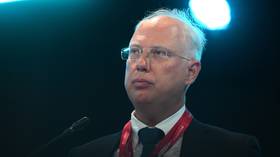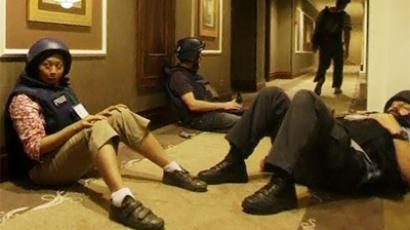Libyan deposits turn Italy oily
Libya’s opposition claims to be in control of most of Tripoli, but there are still reports of resistance by government loyalists. And while the battle continues, the carve-up of Libya's vast oil riches is already in full swing.
Drill to the heart of most modern wars and you will strike oil. Regardless of whether or not that saying is true, when it comes to Libya, oil is going to play a pivotal role in the country’s future.“Here we have two very strong interests that meet. It is the Western interests to tap Libya’s oil, but also the rebels’ or the future Libyan government’s interests to restart selling oil as soon as possible, as this is the first source of revenue for the country. It was under Gaddafi and it will definitely be under Gaddafi’s successors,” journalist Fabrizio Maronta told RT.No stranger to the concept of friends with benefits, Prime Minister Berlusconi has been quick to cozy up to the new transitional council inviting the public face of the group Mahmoud Jabril to Italy for talks.Once Gaddafi’s closest European ally, when the NATO bombing campaign began back in April, Rome abruptly switched sides and began courting the rebels instead. Now the Italian Prime Minister made a promise to Libya's opposition to release US$505 million in Libyan assets frozen in Italian banks.Top of the agenda for Mahmoud Jabril’s visit is expected to be discussions about Italy’s lucrative energy contracts with Libya.Before the war, almost a third of Italy’s daily energy needs were imported from Libya, and oil giant ENI was the largest foreign operator in Libya, with oil and gas contracts running until 2042 and 2047.The Italian government has done all it can to safeguard these contracts. But Italy’s ability to maintain its previously close business ties with the country is by no means a given – in a post Gaddafi Libya, the future looks extremely uncertain and little is guaranteed.One of the biggest problems for both Italy and other Western countries since the beginning of the war has been the struggle to adequately understand the internal workings of the rebels themselves.“Amongst the rebels there are many factions, Islamists, Tunisian people, Al-Qaeda; it’s disorganized and chaotic. And many chiefs of these groups of rebels are former politicians that before were with Gaddafi and then they completely changed their face; they went with the wind as they say in Italy. I think they are corrupt politicians,” said Yvonne Di Vito, an activist from Libyanfriends.com.Di Vito met Gaddafi personally on a number of occasions through business connections. Less than three weeks ago, she returned from a fact finding trip to Libya with a letter she says was written by Gaddafi to Berlusconi.In it Gaddafi allegedly says:“We were surprised by your decision to join the coalition against Libya – especially after we signed a friendship and co-operation treaty between our two sides.”The treaty he refers to was signed just two months before the Libyan uprising. The letter goes on to ask:“Why did you join our enemies without any diplomatic dialogue and investigation?”Political commentator at De Morgen newspaper Yves Desmet questions the trustworthiness of the rebels.“The rebellion movement is a conglomerate of different factions – some tribally oriented, others religiously oriented. They stand united for the moment against the common enemy, but what will happen once the enemy is gone? That remains the question,” he said.
Berlusconi now seems too busy making new friends. And whilst it may be the final chapter for the Gaddafi many fear the conflict will continue.And Italy, along with many in the West, may well now find that previous lucrative relations could turn out to be just as fickle as their own former fair-weather friendships.
The investigative journalist Webster Tarpley believes Italy will be the “biggest loser” in this situation.“What we see right now is an attempt by the French adventurer Sarkozy and his group to essentially push the Italians out. And what we saw today with the visit of this character Jibril in Rome and Milan is the Italians attempting to pay tribute to the new vandals in Benghazi and maybe in Tripoli. The new vandals are demanding tributes. So the Italians say we will give you money, we will leave and give you free oil and gas.“














